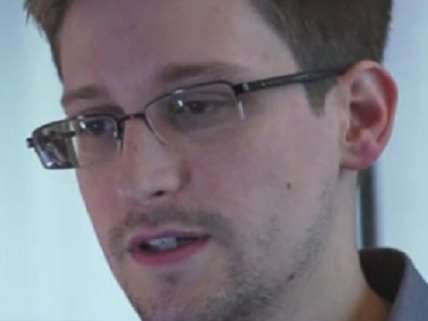Seven Pieces of Good News for Freedom in 2013
Highlights from an eventful year.

Nick Gillespie and Matt Welch's The Declaration of Independents, published in 2011, provides a hopeful outlook for the future of freedom, a vision of how libertarian politics can fix America's problems. How did 2013 pan out for the libertarian moment upon us? Here are seven pieces of good news for freedom this year from some of us here at Reason. —Ed Krayewski
1. No Tolerance for Zero Tolerance

As 2013 began, America was still reeling from a mass murder at a Connecticut elementary school. Parents and officials across the country were nervous that something similar might happen in their backyards, and that nervousness translated into a series of strange school security scares, many of them involving absurd zero-tolerance decrees. The most infamous might be the second-grader in Maryland who was suspended for chewing a Pop-Tart into the shape of a gun.
It was easy to assume that the reign of zero tolerance was just going to get worse, as school districts felt the same bureaucratic imperatives that swept the nation after the Columbine massacre of 1999. It didn't help that both liberals and conservatives were calling for measures that had fed the zero-tolerance beast in the past. But then something unexpected happened. Those silly security scares were mocked in the press. Politicians proposed bills to roll back zero tolerance's excesses, and schools across the country adopted new policies that might not be a civil libertarian's dream but at least give officials more flexibility in doling out punishments and make it less likely that a misbehaving student will be pushed into the criminal justice system. As victories go, these may be small, but a year ago I didn't expect this to be an area where there would be victories to celebrate at all. —Jesse Walker
2. The Sharing Economy Unshackled

In November, the City Commission of Grand Rapids, Michigan unanimously voted down a proposed law that would've made it a crime for residents to advertise on Airbnb, the popular home-sharing platform that provides travelers with an alternative to hotels. California initially sought to quash ride-sharing platforms like Lyft and SideCar that compete with taxi cartels. Then it changed course and in September adopted new regulations allowing these businesses to operate legally in the Golden State.
In 2013, the emerging "sharing economy," in which online platforms allow individuals to trade goods and services amongst themselves, drew opposition from restaurant, taxi, and hotel associations seeking to use their political influence to block competition. But these peer-to-peer businesses scored big wins in several states and municipalities, and it wasn't just libertarians leading the fight for economic freedom. Peers, a new advocacy organization for the sharing economy, is run by Natalie Foster, a veteran of the Obama campaign and MoveOn.org. Foster and her colleagues are applying their experience in grassroots activism to prevent entrenched interests from strangling this nascent sector. —Jim Epstein
3. 3D Printing Guns a Reality

While 3D printing isn't, yet, quite as futuristic as a Star Trek replicator, it brings manufacturing to the desktop and promises to revolutionize and decentralize industry. 3D printing also makes banning physical objects—most famously firearms—an impossible task, since it turns anybody with a printer into a potential manufacturer of almost anything. Just months after the open-source group, Defense Distributed, demonstrated the practicality of a working gun 3D-printed in plastic, U.S.-based Solid Concepts, announced it would sell 3D-printed semiautomatic pistols. —J.D. Tuccille
4. The True Beginning of the End of the Ban on Gay Marriage

A handful of states had already decided to recognize same-sex marriages well before the Supreme Court took up the Defense of Marriage Act in United States v. Windsor earlier this year. The court ruled that the federal government must recognize gay marriages from states that also allow them. The ruling opened up a host of federal privileges and benefits to those who had been denied them entirely because of their sexual orientation, not because of any rational policy. Eight states legalized gay marriage recognition in 2013 (nine if you count California re-legalizing it), more than any year since Massachusetts led the way in 2003. —Scott Shackford
5. White House Not Targeting Marijuana Legalization in Washington, Colorado, Starts to Consider Drug Sentencing Reform
This summer, ten months after voters in Colorado and Washington approved measures legalizing marijuana in their states, the federal government finally weighed in, giving the states a kind of yellow light in a Department of Justice memo that promised prosecutors would exercise restraint if there were "a tightly regulated market" in the states. A few weeks earlier, Attorney General Eric Holder signaled that the Obama Administration was interested in reforming mandatory minimum drug sentencing. Earlier this month, the president commuted the sentence of eight people who had spent more than fifteen years in prison each on various discharges. These measures may all seem like too little, too late, but reveal a changing political reality, one where Republicans like Rand Paul and Democrats like Cory Booker can work together to roll back criminal justice policies that only serve to restrict freedom. —Ed Krayewski
Next: The war that wasn't, the spying that was
6. U.S. Avoids War in Syria

It is hard to find any good news that has come out of Syria in the last year. The brutal conflict continues and has resulted in not only the mindless slaughter of thousands, but also in the growth of a vast humanitarian crisis.
The most significant of the few pieces of good news relating to the conflict in Syria this year is that the U.S. did not carry out a military intervention in the wake of the chemical attacks on Damascus suburbs in August. Despite calls from policy makers around the world for a military response to the chemical attacks, the U.S. agreed to a diplomatic solution with Russia as a way to deal with Syria's chemical weapons. —Matthew Feeney
7. Edward Snowden's NSA Disclosures

Former NSA contractor Edward Snowden's disclosures about that spy agency's clandestine surveillance operations, including the widespread collection of Americans' phone records and a program called Prism that tapped into the servers of many of America's most prominent Internet companies, rocketed the debate about surveillance and civil liberties to the forefront of American political discourse. It put the Obama administration on the defensive, with the president's statements on what the NSA doing being contradicted by subsequent revelations. Over the summer, an amendment that would defund some of the NSA's domestic surveillance fell just seven votes shy of passing in the House, a remarkably close margin. In an interview with the Washington Post, Edward Snowden said his mission was accomplished, explaining that it had been accomplished the moment "journalists were able to work." Though Snowden remains a targeted fugitive of the US government, his ability to get his disclosures out, and of the American press to be able to report on them in a way their British counterparts can't always do, is certainly good news for freedom, even if the substance of the revelations aren't. —Ed Krayewski
Editor's Note: As of February 29, 2024, commenting privileges on reason.com posts are limited to Reason Plus subscribers. Past commenters are grandfathered in for a temporary period. Subscribe here to preserve your ability to comment. Your Reason Plus subscription also gives you an ad-free version of reason.com, along with full access to the digital edition and archives of Reason magazine. We request that comments be civil and on-topic. We do not moderate or assume any responsibility for comments, which are owned by the readers who post them. Comments do not represent the views of reason.com or Reason Foundation. We reserve the right to delete any comment and ban commenters for any reason at any time. Comments may only be edited within 5 minutes of posting. Report abuses.
Please to post comments


I wish I could be as optimistic as Reason was about 2013. For example, the recognition of gay marriages has brought corollary problems such as whether you are free to deny baking someone a wedding cake on religious grounds.
The fact that a city counsel would make it a crime to rent your own bedroom to a guest is telling as to just how out of touch our dear leaders are with reality. To suppress free and clever enterprise when many Americans are struggling to pay their bills stands alone as an example of just how far we have devolved as a nation.
I agree that these small "good news" blips are nearly lost when you consider the flood "bad news" for liberty. Look at all the Police state articles we've read this year. No "secret compartments" in your car, whether they are empty or not. Kids can't sell lemonaid, parents losing more control of their kids to the state, more and more laws about the most mundane things.
I wish I could be more optimistic, but it seems like we're taking one step forward and two steps back. The Government (Fed, state and local) contues to create more laws and regulations as they continue to grow ever larger.
Reason is forever attracted to the twin sisters Polly and Anna, even though they're ugly old hags whose teeth fell out years ago.
For example, the recognition of gay marriages has brought corollary problems such as whether you are free to deny baking someone a wedding cake on religious grounds.
How many fucking times does it have to be explained that this has nothing to do with gay marriage?
At least it's bringing to attention the fact that the Civil Rights Amendment, in regards to forcing those with "public accommodations" to offer them to all (even the offensive) ignoring the owner's freedom to not associate with those whom he prefers not to associate with (say a Jewish hotel owner refusing to host a Nazi conference in his hotel, or a black hotel owner and a KKK convention).
That's a case of government restricting our freedom of association, when it should only apply to government.
Or, we could more closely examine the ideas and trends depicted in this interview. Among the ideas discussed are nationalizing Twitter and Google, forcing tech firms to pay for public transportation, and denying property owners the right to use their property. Lovely. Liberty is dead in this country.
Pure Prog Gold
Second of all, it's privatizing public transit. In another era, the captains of industry would have said, "OK, our workers live here, our factory is there; let's encourage, enforce, and subsidize the improvement of public transit."
Uh, will she protect the "social experimentation" of limited or even no government?
I think you'd have to admit that liberty has come a long way in the world over the last 2-300 years. There are fewer despots, fewer slaves, fewer communist/true socialist nations, fewer oppressed groups of people, more "democracies"... The world, in general, has certainly moved towards liberty.
I would also say, despite righting a handful of social wrongs, our country is certainly backsliding, and has been since 1933. But this is probably to be expected. I put it to you that "democracies" are never more free than at their inception, and become less so as majorities learn they can vote themselves free shit from the minorities.
Epi (and the anarchists) believe this can be fixed by eliminating government altogether. I've come to believe he's right, in that all governments collapse into statism eventually, but you can slow the process down with limits to government power.
The US may very well be near its end. I doubt it can turned around without starting over. But I predict the next iteration will follow the liberty trend and will be even better, as hopefully the next set of Founding Fathers will learn from what happened this time around and set up an even more limited government.
I wouldn't necessarily say that the world has moved towards more "liberty," although I may support the notion that more people on earth perhaps have access to modern technology and such.
We still have genocide, oppressive governments and all that go with them. But now, the slavery is more virtual. We pay higher taxes than ever before and we have more statutes, codes and regulations that ever before. Just because we aren't behind physical bars doesn't always mean we are more free.
And by the way, we do put more people in jail than I would guess has ever happened in world history.
I do not share your optimism. I fear that the next iteration will value equality over liberty, and declare that everyone has a basic right to a minimum standard of living to be paid for by everyone else. This blip of liberty known as the American Experiment will die, and liberty will never be seen again except to be mocked in history books as a period where inequality and unfairness flourished because government failed in its duty to make everyone equal.
This concept of equality is likely what will trigger the collapse, either economically (as seen with Russia), or more violently when the haves decide they will no longer support the havenots.
If it comes to a violent overthrow, "our" side has all the guns and will certainly win. And here's the thing... You're not going to be inviting the losing side to the constitutional convention (I don't recall the Founders inviting the British to give input to the Constitution).
Sarc is just getting off to his own sad-sackery. 'Emotarian'
If you can't see how the massive advances for freedom underlying Snowden, DefCad, and BTC, etc then you have a pretty small brain.
"I fear that the next iteration will value equality over liberty."
This is the supreme difference from libertarians and liberals, of course.
People are sympathetic to Snowden because he's an anti-establishment figure. They'll lionize him but regard the Koch brothers (and their money that support libertarian agendas) as pure evil. And all the lefty Snowden lovers won't actually punish their overlords for eroding their privacy rights and such.
Are incremental advances in personal and "cause celebre" freedom enough to offset the grave harm the ACA and min wage hike will inflict on the economy? I doubt it.
The anarchists are trying to sell you a free lunch. Their theory is nothing but rationalistic fantasy and crudely obvious errors; for instance, a government does not automatically become tyrannical, but the anarchists smuggle the precept of determinism to make it appear that governments do X like mold grows on exposed fruit, and there's just nothing anybody can do about it, because that's just the way it is. **error buzzer**
Freedom really isn't free. Its price is not blood or money or anarchy, but an objective government derived from human rationality.
a government does not automatically become tyrannical
Name one instance where this didn't happen.
Without an effective mechanism for removing crappy legislation and regulation (no such mechanism has yet to be implemented in the history of the world and never will be because it is human nature to not willingly relinquish power) then the natural progression is for these crappy rules to accumulate as the crappy consequences of crappy rules result not in repeal but in more crappy rules, with the logical conclusion being a totalitarian state where every nuance of daily life is governed by crappy rules backed with real threats of organized violence.
My wife suggested a pretty damn good idea on this. It's kind of a play on Jefferson's new government/constitution every generation idea.
Write it into the constitution that all laws sunset after X years, as well as a prohibition AGAINST reinstating all of them at once. Make Congress fully repass every fucking one. Bad law will die on the vine and it will tie the bastards up so much they'll NEVER have time to invent new ways of repressing us.
"...all governments collapse into statism eventually, but you can slow the process down with limits to government power."
This is human nature - a sort of tragedy of the common of power. Each leader stretches his/her power 'to do good', without considering the damage to the limits we need. It's a ratchet - like the good idea in evolution - that is locked in in later generations because it provides survival advantages.
The anarchists do not understand how power works. For anarchy to prevail would require a new Anarchist Man every bit as much as the USSR required the new Soviet Man.
Government is vital. We must have governance to protect our rights.
NOT LEGALLY RECOGNIZING SOMETHING IS NOT THE SAME AS BANNING IT! FUUUUUUUUUUCK!
That's an excellent point. The gay marriage issue is a canard and most certainly a double-edged sword.
Now, if you speak out publicly as opposing anal intercourse between men, you're guilty at most of hate speech, and at least of being a bigot. That's not free at all.
It's not freedom to be telling others what they can and can not do with their own lives and bodies either. So ending the ban on doing what Americans choose to do and not do with their own lives and bodies is a victory for freedom.
Other than that the issue is an irrelevant one.
The legal recognition is what defines it, so sarc is merely engaging in sohistry.
#8 Bitcion
Jury is still out on that one although conceptually it's not bad, it's probably better to stick with local currencies that can't be manipulated by speculation.
Uhhh... With a large enough capital base, ANYTHING can be "manipulated by speculation," witness the US dollar manipulated by the Federal Reserve and the Treasury Dept's Exchange Stabilization Fund.
I never understood this new "zero tolerance" nonsense and why it applies to children and young adults yet authority, corporations and government are given endless tolerance to the horrible things they do to people and society everywhere. It should the opposite way around. Childhood is meant to be the time to screw up and make mistakes. If you are in a position of authority, profit and/or government you are being paid to behave properly, there should be more accountability to people in those positions, period.
It's time we had zero tolerance for zero tolerance or we are going to see a bleak, angry and dangerous future.
Thank you very much